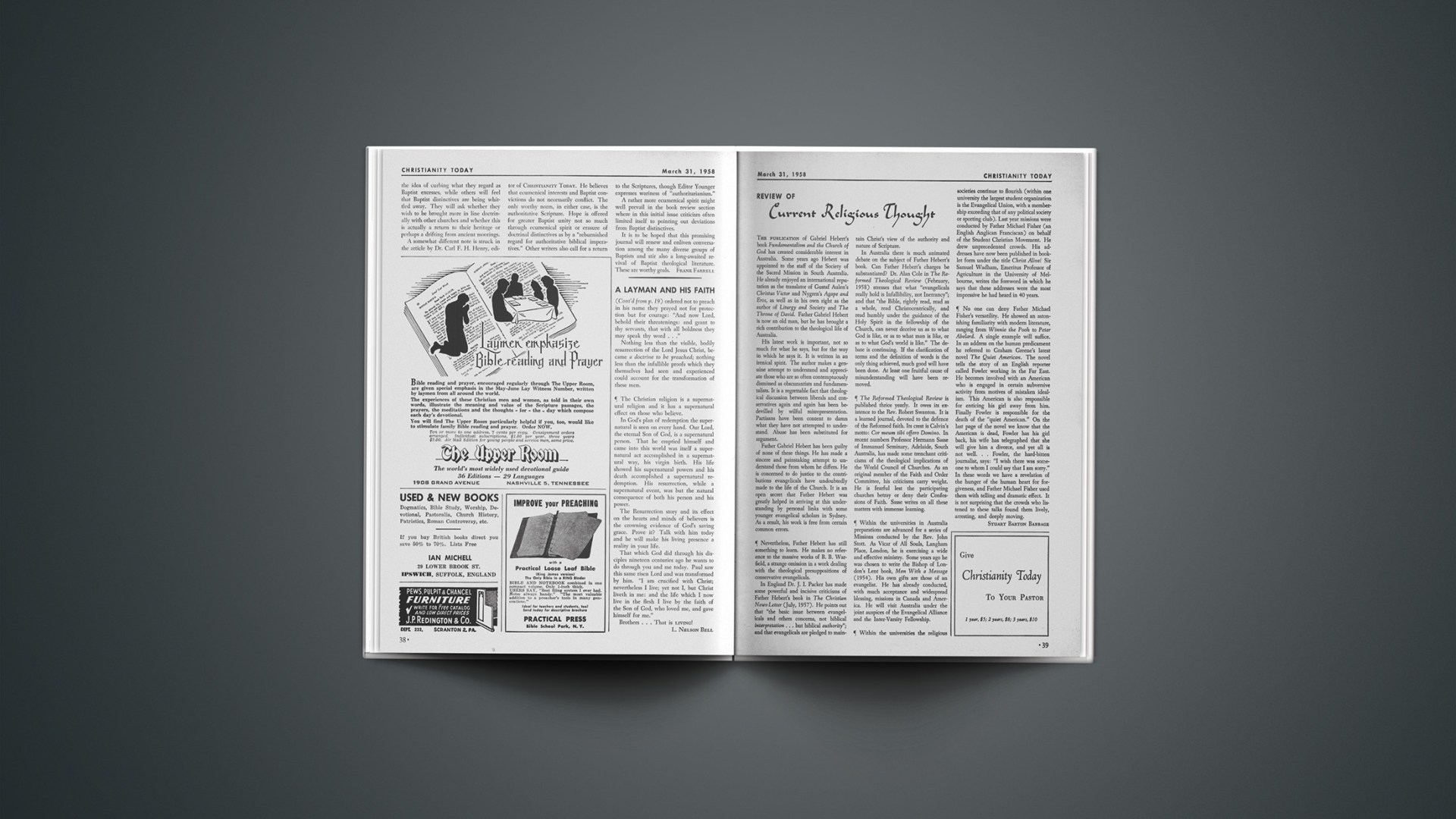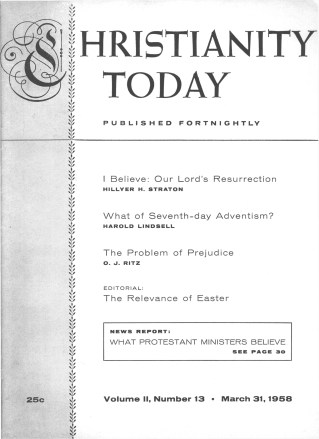The publication of Gabriel Hebert’s book Fundamentalism and the Church of God has created considerable interest in Australia. Some years ago Hebert was appointed to the staff of the Society of the Sacred Mission in South Australia. He already enjoyed an international reputation as the translator of Gustaf Aulen’s Christus Victor and Nygren’s Agape and Eros, as well as in his own right as the author of Liturgy and Society and The Throne of David. Father Gabriel Hebert is now an old man, but he has brought a rich contribution to the theological life of Australia.
His latest work is important, not so much for what he says, but for the way in which he says it. It is written in anirenical spirit. The author makes a genuine attempt to understand and appreciate those who are so often contemptuously dismissed as obscurantists and fundamentalists. It is a regrettable fact that theological discussion between liberals and conservatives again and again has been bedevilled by wilful misrepresentation. Partisans have been content to damn what they have not attempted to understand. Abuse has been substituted for argument.
Father Gabriel Hebert has been guilty of none of these things. He has made a sincere and painstaking attempt to understand those from whom he differs. He is concerned to do justice to the contributions evangelicals have undoubtedly made to the life of the Church. It is an open secret that Father Hebert was greatly helped in arriving at this understanding by personal links with some younger evangelical scholars in Sydney. As a result, his work is free from certain common errors.
Nevertheless, Father Hebert has still something to learn. He makes no reference to the massive works of B. B. Warfield, a strange omission in a work dealing with the theological presuppositions of conservative evangelicals.
In England Dr. J. I. Packer has made some powerful and incisive criticisms of Father Hebert’s book in The Christian News-Letter (July, 1957). He points out that “the basic issue between evangelicals and others concerns, not biblical interpretation … but biblical authority”; and that evangelicals are pledged to maintain Christ’s view of the authority and nature of Scripture.
In Australia there is much animated debate on the subject of Father Hebert’s book. Can Father Hebert’s charges be substantiated? Dr. Alan Cole in The Reformed Theological Review (February, 1958) stresses that what “evangelicals really hold is Infallibility, not Inerrancy”; and that “the Bible, rightly read, read as a whole, read Christocentrically, and read humbly under the guidance of the Holy Spirit in the fellowship of the Church, can never deceive us as to what God is like, or as to what man is like, or as to what God’s world is like.” The debate is continuing. If the clarification of terms and the definition of words is the only thing achieved, much good will have been done. At least one fruitful cause of misunderstanding will have been removed.
The Reformed Theological Review is published thrice yearly. It owes its existence to the Rev. Robert Swanton. It is a learned journal, devoted to the defence of the Reformed faith. Its crest is Calvin’s motto: Cor meum tibi offero Domino. In recent numbers Professor Hermann Sasse of Immanuel Seminary, Adelaide, South Australia, has made some trenchant criticisms of the theological implications of the World Council of Churches. As an original member of the Faith and Order Committee, his criticisms carry weight. He is fearful lest the participating churches betray or deny their Confessions of Faith. Sasse writes on all these matters with immense learning.
Within the universities in Australia preparations are advanced for a series of Missions conducted by the Rev. John Stott. As Vicar of All Souls, Langham Place, London, he is exercising a wide and effective ministry. Some years ago he was chosen to write the Bishop of London’s Lent book, Men With a Message (1954). His own gifts are those of an evangelist. He has already conducted, with much acceptance and widespread blessing, missions in Canada and America. He will visit Australia under the joint auspices of the Evangelical Alliance and the Inter-Varsity Fellowship.
Within the universities the religious societies continue to flourish (within one university the largest student organization is the Evangelical Union, with a membership exceeding that of any political society or sporting club). Last year missions were conducted by Father Michael Fisher (an English Anglican Franciscan) on behalf of the Student Christian Movement. He drew unprecedented crowds. His addresses have now been published in booklet form under the title Christ Alive! Sir Samuel Wadham, Emeritus Professor of Agriculture in the University of Melbourne, writes the foreword in which he says that these addresses were the most impressive he had heard in 40 years.
No one can deny Father Michael Fisher’s versatility. He showed an astonishing familiarity with modern literature, ranging from Winnie the Pooh to Peter Abelard. A single example will suffice. In an address on the human predicament he referred to Graham Greene’s latest novel The Quiet American. The novel tells the story of an English reporter called Fowler working in the Far East. He becomes involved with an American who is engaged in certain subversive activity from motives of mistaken idealism. This American is also responsible for enticing his girl away from him. Finally Fowler is responsible for the death of the “quiet American.” On the last page of the novel we know that the American is dead, Fowler has his girl back, his wife has telegraphed that she will give him a divorce, and yet all is not well.… Fowler, the hard-bitten journalist, says: “I wish there was someone to whom I could say that I am sorry.” In these words we have a revelation of the hunger of the human heart for forgiveness, and Father Michael Fisher used them with telling and dramatic effect. It is not surprising that the crowds who listened to these talks found them lively, arresting, and deeply moving.










